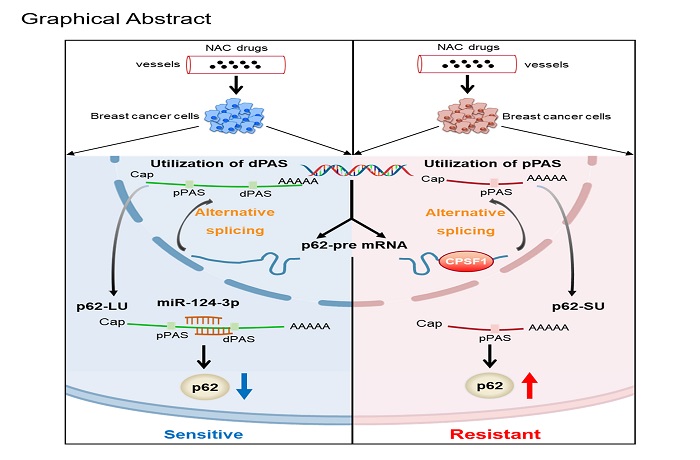Recently, Prof. Wu Zhengsheng’s team published a paper entitled “An alternatively spliced p62 isoform confers resistance to chemotherapy in breast cancer” in Cancer Research (IF=13.312), a journal of the American Association for Cancer Research (AACR), and a leading international journal in the field of oncology research. Guo Qianying and Wang Hao, PhD students in the Department of Pathology, School of Basic Medicine, are co-first authors; Wu Zhengsheng is the final corresponding author; and Huang Xing, a researcher at Zhejiang University, and Tan Sheng, an associate researcher at Shanghai Jiao Tong University, are co-corresponding authors. Our university is the first author and corresponding author affiliation.
Chemotherapy resistance is one of the major causes of treatment failure in breast cancer, especially in breast cancer patients receiving Neoadjuvant Chemotherapy (NAC), where complete pathological remission is not achieved in more than 80% of cases, resulting in poor patient outcomes or even treatment failure. Therefore, understanding chemotherapy resistance in breast cancer and its mechanisms is essential to improve patient outcomes and prognosis.

This study first sequenced RNA from clinical tumor samples of breast cancer patients receiving NAC and validated by real-time fluorescence quantitative PCR, 3'RACE and Northern blot to identify a novel p62 mRNA spliced transcript (p62-SU) that carries a short 3'-UTR, whose expression is closely associated with breast cancer chemotherapy resistance. Through a series of in vitro and in vivo experiments, p62-SU was found to significantly enhance cell viability, migratory capacity, invasiveness and chemoresistance of breast cancer cells relative to a p62 mRNA transcript known to carry a full-length 3'-UTR (p62-LU); CPSF1 mediated the 3'-UTR truncation of p62 mRNA through alternative splicing. The research study proved that p62-SU could produce more p62 protein by evading the inhibition of miR-124-3p, which ultimately led to chemoresistance in breast cancer. The results of this study showed that the CPSF1-p62-miR-124-3p signaling pathway is involved in the process of chemoresistance in breast cancer, providing new theoretical clues for understanding tumor treatment resistance and targeted therapy.
Link to the paper: https://aacrjournals.org/cancerres/article-abstract/doi/10.1158/0008-5472.CAN-22-0909/708925/An-alternatively-spliced-p62-isoform-confers?redirectedFrom=fulltext
